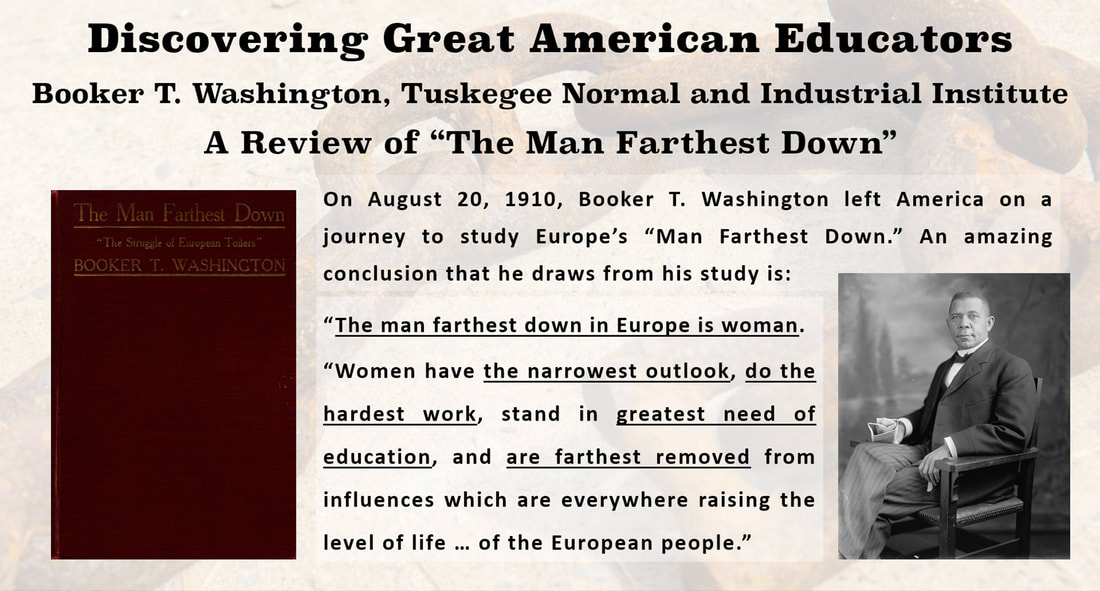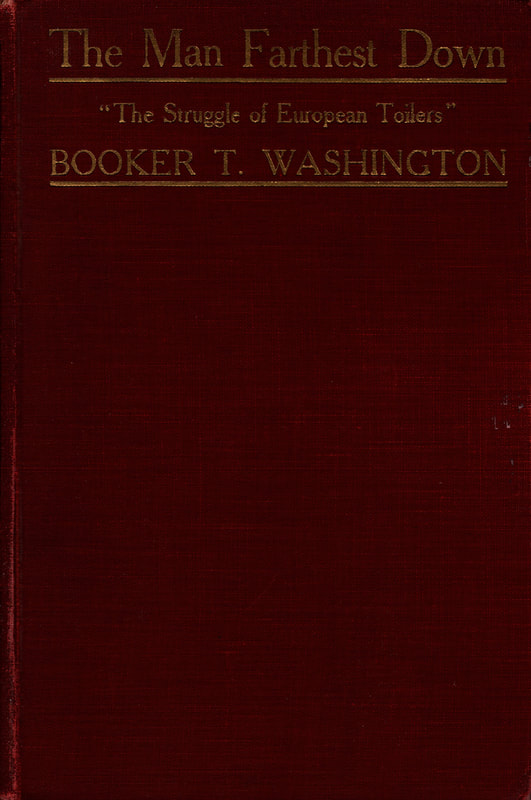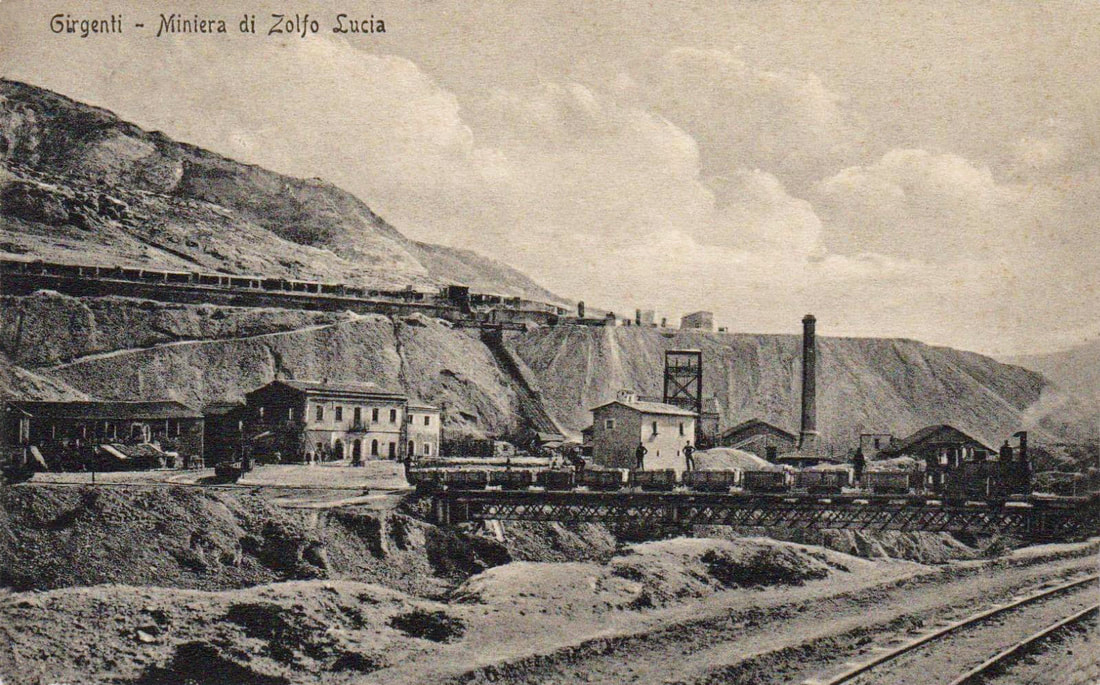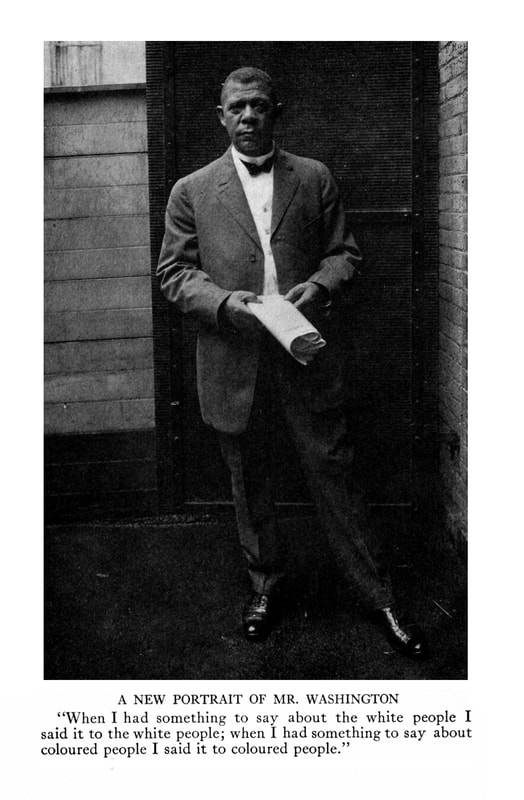Review of Booker T. Washington's "The Man Farthest Down"
|
|
Date Published: October 14, 2023
|
“On August 20, 1910, Booker T. Washington left America on a journey to study Europe’s “Man Farthest Down.” He returned a little less than two months later on October 13th.
One amazing conclusion that he draws from his travels and studies is that, “The man farthest down in Europe is woman. Women have the narrowest outlook, do the hardest work, stand in greatest need of education, and are farthest removed from influences which are everywhere raising the level of life of the European people.”
One amazing conclusion that he draws from his travels and studies is that, “The man farthest down in Europe is woman. Women have the narrowest outlook, do the hardest work, stand in greatest need of education, and are farthest removed from influences which are everywhere raising the level of life of the European people.”
Peter E. Greulich, “Book Review,” October 2023
A Review of Booker T. Washington's "The Man Farthest Down"
- Reviews of the Day: 1912–13
- Selected Insights from "The Man Farthest Down"
- The Man Farthest Down Was … Women
- Booker T. Washington's Positive Outlook on the Negro Race
- Thoughts on the Mafia and the Sicilian People while Crawling through a Sicilian Sulfur Mine
- Spending a Day with John Burns: A Quite Personal Experience
- This Author’s Thoughts and Perceptions on "The Man Farthest Down"
Reviews of the Day: 1912–13
In starting my research, it was amazing to discover the number of newspapers who carried Booker T. Washington’s leaving for, traveling within, and returning from Europe in the months of August, September, and October of 1910. The coverage crossed the political spectrum of the United States and England. I am sure that he was also well covered while traveling within Europe by the local papers—the itinerary is included in a map below, because it makes sense that a man—a black man, who was received in audience by King Frederick and Queen Louise of Denmark probably made headlines on the continent as well.
So, as might be expected, Doubleday, Page & Company appears to have poured an amazing amount of money into advertising the book when it was published, and this resulted in an amazing number of reviews. Here are a just a few—a representative sample, that I am selecting and publishing as “Reviews of the Day: 1912–13.” One of the most informed and balanced of the many I read is up first. It is from one of the finest of newspapers of the time located in London, England: “The Guardian.”
So, as might be expected, Doubleday, Page & Company appears to have poured an amazing amount of money into advertising the book when it was published, and this resulted in an amazing number of reviews. Here are a just a few—a representative sample, that I am selecting and publishing as “Reviews of the Day: 1912–13.” One of the most informed and balanced of the many I read is up first. It is from one of the finest of newspapers of the time located in London, England: “The Guardian.”
|
“Hunting the man farthest down in Europe would seem a depressing task, were not this book before us to prove the contrary. … Booker T. Washington shows that America is not alone in possessing a ‘race question;’ Austria-Hungary and Eastern Europe generally present a conflict of nationalities and … in the author’s view, this is not much more complicated when one race happens to be black and the other white. … In every case the solution depends on the people themselves; it depends on national awakening and readiness to accept responsibility. …
“Mr. Washington has done the work of his survey well, and has succeeded in writing a book which is as lively as it is illuminating, and no one interested either in the peasant question in Europe or the race problem in America can afford to do without.” “New Books,” The London Guardian
September 16, 1912 |
European Map showing the itinerary of Booker T. Washington while in Europe in search of the man farthest down.
|
“During a recent vacation in Europe, Dr. Booker T. Washington, head of the Tuskegee Institute, … investigated the working and living conditions of the laboring people of the continent. He wrote a series of letters which appeared in ‘The Outlook,’ and these he has elaborated on and published in a book entitled ‘The Man Farthest Down: The Struggle of European Toilers.’
“The object of the author was to contrast conditions among European toilers with those which prevail in the South, where nine millions of negroes do labor. … In the matter of property holding, Dr. Washington finds that the American negro is far ahead of most of the working classes in Europe. …
“Investigations were prosecuted in England, Italy, Hungary, Austria, Russia, Poland, and Denmark. The comparison of conditions found in these countries were all favorable to the American Negro.”
“The object of the author was to contrast conditions among European toilers with those which prevail in the South, where nine millions of negroes do labor. … In the matter of property holding, Dr. Washington finds that the American negro is far ahead of most of the working classes in Europe. …
“Investigations were prosecuted in England, Italy, Hungary, Austria, Russia, Poland, and Denmark. The comparison of conditions found in these countries were all favorable to the American Negro.”
Book Reviews, “The Man Farthest Down,” The Brooklyn Daily Eagle, 1912
[A comment from this author concerning the above review: Mr. Washington writes that the Denmark “peasant” was in a better place than the negroes of the United States. This information is contained in and the focus of Chapter XVII: The Organization of Country Life in Denmark. It was in Denmark that he writes, “it was not until I reached Denmark that I saw what the possibilities of the peasant were.”]
“The latest book of the celebrated negro educator is of special interest to the student of social, economic and race problems. … There is no doubt that the wretches in London’s worst slums, the Polish and Sicilian peasants and the laborers in the Sicilian sulphur mine, to mention only a few … are, if anything, more wretched than the negroes in many of the southern states. It may also be conceded that their future is less hopeful in many respects. …
“But this does not in our judgement, atone for the quieting advice that he gives his own people. The black worker no more than the white laborer should be persuaded into a sense of relief because of the knowledge that somewhere else in the world there are workers laboring under more harsh conditions. …
“We wish that one with a clearer vision of the worldwide struggle for the working class had gone on the same mission … and gathered the same information and interpreted it in the light of the highest ideas that inspire the working people in the modern nations of the world.”
“But this does not in our judgement, atone for the quieting advice that he gives his own people. The black worker no more than the white laborer should be persuaded into a sense of relief because of the knowledge that somewhere else in the world there are workers laboring under more harsh conditions. …
“We wish that one with a clearer vision of the worldwide struggle for the working class had gone on the same mission … and gathered the same information and interpreted it in the light of the highest ideas that inspire the working people in the modern nations of the world.”
“What’s in the New Books,” James O'Neal, The Coming Nation, 1912
Selected Insights from "The Man Farthest Down"
|
- The Man Farthest Down Was … Women “The thing that impressed me most, however, was the condition of the laboring women of Europe.
“I do not know the statistics, but if I am permitted to judge by what I saw I should say that three fourths of the work on the farms, and a considerable part of the heavy work in the cities of Europe, is performed by women. Not only that, but in the low life of great cities, like London, it seems to me that the women suffer more from the evil influences of slum life than the men. “In short, if I may put it this way, the man farthest down in Europe is woman. Women have the narrowest outlook, do the hardest work, stand in greatest need of education, and are farthest removed from influences which are everywhere raising the level of life among the masses of the European people.” |
Image of the front cover of “The Man Farthest Down.”
|
- Booker T. Washington's Positive Outlook on the Negro Race
“Not infrequently, when in my public speeches I have made some reference to the condition of the Negro in the South, certain members of my own race in the North have objected because, they said, I did not paint conditions in the South black enough. … In London a man attacked me because in my public interviews I emphasized the opportunities rather than the wrongs of the Negro in the South. …
“It has not been my purpose in anything I have written to pass judgment upon the people or the conditions that I have found in the countries which I have visited. Criticism is an ungrateful task at best, and one for which I am not well fitted. … What I am anxious to do here is to emphasize some of the advantages which it seems the members of my own race, and particularly those living in the Southern States, have at the present time.
“It is not difficult to discover the disadvantages under which the Negroes in the South labor. Every traveler who passes through the South sees the conditions and frequently returns to write books about them. There is danger, however, that the opportunities to which I have referred will be overlooked or not fully appreciated by the members of my race until it is too late.”
“It has not been my purpose in anything I have written to pass judgment upon the people or the conditions that I have found in the countries which I have visited. Criticism is an ungrateful task at best, and one for which I am not well fitted. … What I am anxious to do here is to emphasize some of the advantages which it seems the members of my own race, and particularly those living in the Southern States, have at the present time.
“It is not difficult to discover the disadvantages under which the Negroes in the South labor. Every traveler who passes through the South sees the conditions and frequently returns to write books about them. There is danger, however, that the opportunities to which I have referred will be overlooked or not fully appreciated by the members of my race until it is too late.”
- Thoughts on the Mafia and the Sicilian People while Crawling through a Sicilian Sulfur Mine
|
“I ventured to visit the region which has the reputation of being the most wicked, … the region around and north of Girgenti, which is the seat at once of the sulfur mines and the Mafia. …
"It had been many years since I had been in a mine, but as I entered the dark, damp gallery and felt the sudden underground chill, the memories of my early experiences all came back to me. … "I had known what it was to work deep down under the earth, but I never before so thoroughly realized what it meant to be in the bowels of the earth as I did while I was groping my way through the dark and winding passages of this sulfur mine. … |
Booker T. Washington worked in the mines in America as a youth. This is a representation of a Sicilian sulfur mine as discussed in this book. This image of Lucia Mine in Sicily is from Wikimedia Commons.
|
“If anyone had told me before I went to Sicily that I would be willing to entrust my life to Sicilians away down in the darkness of a sulfur mine, I should have believed that such a person had lost his mind. I had read and heard so much of murders of the Mafia in Sicily, that for a long time I had a horror of the name of Sicilians; but when I came in contact with them, before I knew it, I found myself trusting them absolutely to such an extent that I willingly followed them into the bowels of the earth; into a hot, narrow, dark sulfur mine where, without a moment’s warning, they might have demanded my life or held me, if they cared to, for a ransom.
“Nothing of this kind occurred; on the other hand, I repeat, every Sicilian with whom I came in contact in the sulfur mine treated me in the most kindly manner, and I came away from their country having the highest respect for them.”
“Nothing of this kind occurred; on the other hand, I repeat, every Sicilian with whom I came in contact in the sulfur mine treated me in the most kindly manner, and I came away from their country having the highest respect for them.”
- Spending a Day with John Burns: A Quite Personal Experience
|
“I had heard a good deal, from time to time, about John Burns before I went to Europe, and when I reached London, I took advantage of the first opportunity that offered to make my acquaintance with him a personal one. This meeting was a special good fortune to me at the time because, as I already knew, there is in all probability, no one in England who better understands the hopes, ambitions, and the prospects of the laboring classes. …
“We passed on the streets, groups of neatly-dressed, well-bred looking boys with their books slung over their arms, going home from school or making their way to the park. Mr. Burns was delighted at the sight of these clean-cut, manly looking fellows. |
London Map showing one day’s itinerary of Booker T. Washington with John Burns near the end of his stay in Europe.
|
“ ‘Look at those boys, Mr. Washington,’ he would exclaim, as he pointed proudly to one or another of these groups. ‘Isn’t that doing pretty well for the proletariat?’
“Then he would leap out of the automobile, before the driver could stop, put his arm around the boy nearest him and, in a moment, come back triumphant with the confirmation of his statement that the boy’s father was, as he had said, only a small clerk or a letter carrier, or, perhaps, the son of a common laborer.”
“Then he would leap out of the automobile, before the driver could stop, put his arm around the boy nearest him and, in a moment, come back triumphant with the confirmation of his statement that the boy’s father was, as he had said, only a small clerk or a letter carrier, or, perhaps, the son of a common laborer.”
I went to Wikipedia for information on John Burns, but as with so much that is written in this failing internet forum, it felt so impersonal and at times so very biased in what was written—individuals force their current-day perspectives on a past day and time with little to no consideration for the history of the day. I found this chapter in “The Man Farthest Down” that describes the day that Booker T. Washington spends with John Burns very personal, down to earth, and enlightening. Select this link to read: Chapter XIX - John Burns and the Man Farthest Down in London.
This Author's Thoughts and Perceptions on "The Man Farthest Down"
After establishing a Home Page for Booker T. Washington to capture my reviews of three of his other works, (Up From Slavery, Character Building, and My Larger Education) this book did not disappoint. All of his books so far have met with my highest of standards. He published this book just three years before his death in 1915 at the age of 59, and it reinforces the type of life that Dr. Washington wanted to live—a life dedicated to the advancement of the people of his race through any positive means.
|
I included one of the reviews above because I think that most any reader, initially reading this book, might feel the same way. Mr. Washington constantly reminds the reader of the conditions of the “man farthest down” in Europe and then compares that with the conditions facing the Negroes in the South.
The reviewer states:
But this does not in our judgement, atone for the quieting advice that he gives his own people. The black worker no more than the white laborer should be persuaded into a sense of relief because of the knowledge that somewhere else in the world there are workers laboring under more harsh conditions. … I did not find any “quieting advice” in this book. Rather, Dr. Washington's overall tone is for his race is to always keep moving, keep working, keep getting educated—find your skill and develop it. The best description that I have found of how Booker T. Washington’s style of leadership and approach to life compares with W. E. B. Du Bois’ approach was in a book written by Ray Stannard Baker, “Following the Color Line.” |
“In a former chapter I showed how the Negroes of the country are divided into two parties or points of view, the greater led by Booker T. Washington, the lesser by W. E. B. Du Bois. Washington’s party is the party of the opportunist and optimist, which deals with the world as it is: it is a constructive, practical, cheerful party. It emphasizes duties rather than rights. Dr. Du Bois’s party, on the other hand, represents the critical point of view. It is idealistic and pessimistic: a party of agitation, emphasizing rights rather than duties.
“But these two points of view [Booker T. Washington's and W. E. B. Du Bois'] are by no means peculiar to Negroes: they divide all human thought; and the action and reaction between them is the mode of human progress.”
“But these two points of view [Booker T. Washington's and W. E. B. Du Bois'] are by no means peculiar to Negroes: they divide all human thought; and the action and reaction between them is the mode of human progress.”
With this context, I would encourage you to enjoy this most enlightening work by Booker T. Washington. From a personal perspective he may have almost crossed paths with my family. My grandparents left Austria-Hungary in the late 19th century coming to the United States. The conditions they faced in Europe and particularly in Austria-Hungary was a major component of this book by Booker T. Washington.
For this reason alone, this book was a fascinating read for this author.
Cheers,
- Peter E.
For this reason alone, this book was a fascinating read for this author.
Cheers,
- Peter E.





